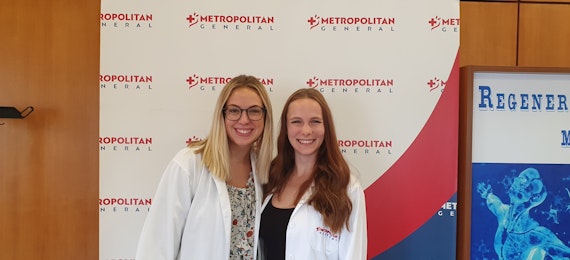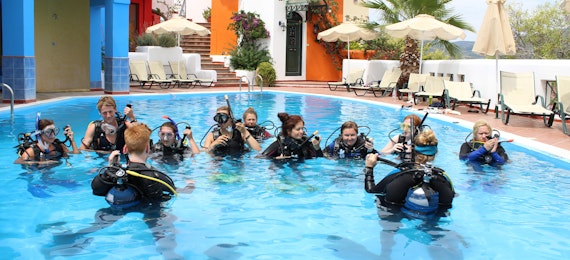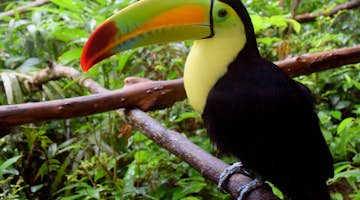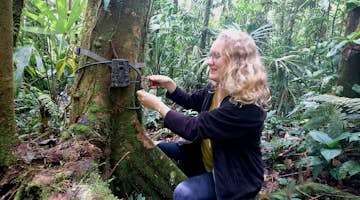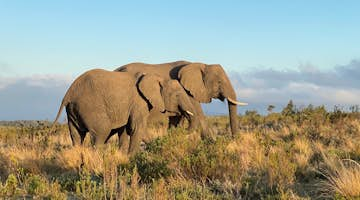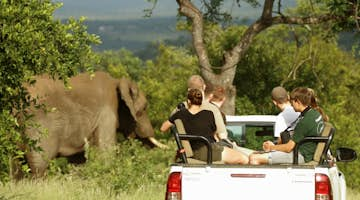
Wildlife, Ecology & Anthropological Research Internships: Intern abroad in Mogalakwena, South Africa
Wildlife Research interns support multidisciplinary projects and field research, contributing to the local and broader scientific community. Ongoing long-term projects rely on standardized data collection, including field research, analysis, and write-up requirements. Wildlife research projects can range from feeding ecology, wildlife social behavior, and movement patterns of animals. Ecological projects can involve alien plant species impact, tree ecology studies, and sustainable cultivation of indigenous plants, and trees with commercial significance. Anthropological research is run through a partner business, for Craft Art Development. It focuses on oral culture and social enterprise. All research focus areas are subject to availability and season.
What to expect from your Wildlife, Ecology & Anthropological Research internship:
- Gain multidisciplinary field research experience, collaborating with postgraduates and independent researchers.
- Contribute in a meaningful way to local community development and scientific research.
- Develop experience and confidence related to standardized scientific research methodology.
- Gain an opportunity for publication in scientific journals in collaboration with research project leaders.
Your internship abroad host organization:
- Research Centre
Internship details
South Africa is a prime destination for Wildlife, Ecology & Anthropological research opportunities. If you’re passionate about field work experience that will make a mark, while providing the adventure of a lifetime, this is for you! Whether you’re interested in a discipline specific or interdisciplinary research opportunity to set your internship apart, you’ll discover enriching opportunities at the Mogalakwena Game Reserves, to accommodate diverse academic requirements and personal interests.
This is an in-country internship, with accommodation included. You can explore remote Environmental & Marine Sciences internships, if you are looking for an internship program that you can undertake from home.
All Wildlife, Ecology & Anthropological Research Internships are hosted together, via the same Research Centre. Located within the Mogalakwena Game Reserves, within the Waterberg Biosphere of northern Limpopo, you’ll be situated near the beautiful Mogalakwena River. This exclusive reserve features giraffes and other iconic species, such as herbivores (antelope) and primates (Vervet monkey troops). This exceptional region of South Africa is a UNESCO designated Biosphere Reserve. The Waterberg Biosphere contains archaeological finds dating to the Stone Age and rock paintings. Wildlife on the Mogalakwena Reserve is diverse with 16 herbivore, 16 carnivore, 4 primate and 310 bird species having been identified on the reserve. This small, private reserve does not have typically dangerous game (i.e. there are no buffalo, elephants, cheetah or lion), however African leopards are a common visitor. The reserve mainly has free-roaming giraffes, ostrich, jackals, brown hyena (and the very occasional hippopotamus).
Interns receive comprehensive support via orientation, instruction of project methodology, and field supervision. The on-site Research Manager has a Ph.D and oversees all research. Other onsite supervisors have achieved Masters degrees. The spirit of this internship program lies in a desire to create and inspire new generations of scientists. Interns can expect weekly meetings, progress reports, research deadlines, and assistance with all aspects of project work - from conceptualization, creating research questions, learning about scientific method, generating a hypothesis, and development of data analysis. Outside of this structure, all interns are expected to independently conduct daily research and data collection requirements, according to topic(s) of interest. The last week of your internship will be dedicated to the presentation of findings.
Project availability can be impacted by seasonality and popularity of choice. Preferences are supported and accommodated as much as possible but some flexibility may be required. If you are interested in learning a new research method or if you wish to study specific research questions, please discuss these with us in advance.
Broad Wildlife research topics include:
- Species competition and interaction (e.g. burrow occupancy, nesting cavities, competition between African civet and the black-backed jackal, herbivore water usage).
- Species vigilance (e.g. Vervet monkey troops and herbivores)
- Behavioral adaptations of species to climate change (e.g. behavioral patterns and site selection by arachnids, micro-habitat selection of reptiles, behavioral thermoregulation in giraffes, influence of environmental factors on avian density and diversity, influence of temperature and rainfall on baobab water content, effect of high temperatures on breeding success of hornbills - November to March only).
- Monitoring of populations (e.g.Dung Beetle abundance and diversity, monitoring of reptile and amphibian diversity, African civet latrine use, invertebrate inventory and update of collection, invasive plant species identification, distribution and control).
Other:
- Carbon footprint assessment
- GIS projects
- Small mammal trapping
- Oral culture - Bapedi, Bahananwa, Batlokwa and Babirwa - Northern Sotho culture (Anthropology)
- Edible insects of the Blouberg region (Anthropology)
Optional Horticulture / Botanical business focus areas:
- Integrated pest management
- Ecosystem services
- Bioprospecting
- Sustainable production of Marula and Baobab fruits
- Domestication of emerging indigenous crops
- Elicitation of bioactive properties and medicinal compounds
Typical Schedule
-
Monday to Friday, weekends are free. A typical day may include two field work sessions (depending on project), approx. 3 hours each. Writing becomes more significant throughout the end of the internship duration. Please note that fieldwork can often be quite challenging. In summer, temperatures can exceed 104°F (40°C) and in winter the mornings are chilly, the ground is uneven with rocks and sand, and most bushes have thorns. Plan your internship schedule with seasonality and climate in mind.
What are the career benefits of interning abroad as a Wildlife, Ecology & Anthropological Research Intern?
Wildlife, Ecology & Anthropological Research interns learn from a qualified and experienced supervisor, and can be involved in:
-
Instruction of project methodology and introduction to South African wildlife, ecology, and anthropology topics.
-
Independent field research project(s) and observation.
-
Data analysis, reporting, and presentation.
Professional development opportunities:
-
Gain academic research experience and an understanding of environmental science methodologies.
-
Develop practical field work skills related to observation, data analysis, and reporting.
-
Build confidence and independence, developing independent research questions and projects.
-
Gain practical skills and boost your employability, with guidance from Intern Abroad HQ’s Experiential Learning Curriculum to support your learning and cultural intelligence
Are you eligible for this internship?
Submit a free application so we can confirm your eligibility and check availability for your preferred dates.
Not sure which program to join?
South Africa photo gallery
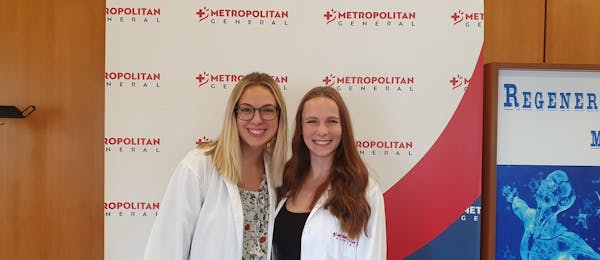
Academic credit available for all internships
Get course credit from your college or university while completing your internship abroad or a remote internship program. It's a great way to meet your academic requirements and gain valuable experience at the same time.
Learn about course creditProgram fees
Applying for our Wildlife, Ecology & Anthropological Research Internship is completely free! The support package covers the assistance we provide in finding your internship and arranging your living accommodations in your host country, ensuring you thrive during your program.
Please note that a deposit of US$499 is required to confirm your place. The remaining balance (minus your initial US$499 deposit) is due at least 60 days before your internship start date.
Duration |
Program Fee (USD) |
|---|---|
| 4 weeks | $1,953 Equivalent to $69 /day |
| 5 weeks | $2,179 Equivalent to $62 /day |
| 6 weeks | $2,515 Equivalent to $59 /day |
| 8 weeks | $3,137 Equivalent to $56 /day |
| 10 weeks | $3,734 Equivalent to $53 /day |
| 12 weeks | $4,305 Equivalent to $51 /day |
| 16 weeks | $5,504 Equivalent to $49 /day |
| 20 weeks | $6,758 Equivalent to $48 /day |
| 24 weeks | $7,902 Equivalent to $47 /day |
- Airport pick-up
- Airport drop-off
- Accommodation
- 24/7 in-country support
- Program orientation
- Dedicated support before, during, and after your internship
- In-country guidance for social and tourist activities
- Sourcing and securing your internship placement
- Personalization of your internship plan
- Coaching from your supervisor
- Documented portfolio of your experiential learnings
- Academic credit facilitation
- International reference letter
- Certificate of Internship Completion
- Meals
- Visa (if required), flights, travel insurance (mandatory), vaccinations, criminal background check
- Personal spending money for snacks, drinks, public transport, laundry, and leisure activities during your free time.
Activities and tourism
This internship is located in a rural area; however, it is possible to arrange weekend excursions or trips through tour operators in the Limpopo region. The nearby lodge (within walking distance) can be accessed, if permission is sought from the lodge manager during quiet times. This can grant access to lodge facilities, such as the swimming pool, at no cost. There is also a volleyball court and craft center in the vicinity, where workshops such as weaving, embroidery, and textile art can be booked.
Arrival and Orientation
Wildlife, Ecology & Anthropological Research internships in South Africa begin every Tuesday of the month. This internship has limited capacity and we encourage interns to plan in advance, to secure your preferred internship dates. Interns may choose to spend a minimum of 4 weeks, up to a maximum of 24 weeks.
Airport pick up, drop off and accommodation are included in the Program Fee. The accommodation is covered from the Tuesday night of your start date - interns are required to arrive on their start date and are asked not to book flights until your placement has first been confirmed. Specific instructions will then be provided for arrival and departure logistics.
The main port of entry for this internship is Polokwane International Airport (PTG). Airport pick up (included in the program fee) is provided from this airport only. If you arrive in South Africa through another international gateway (such as Johannesburg, OR Tambo International Airport or Cape Town, Cape Town International Airport) then you will need to arrange a connecting flight into Polokwane International Airport.
Interns are met on arrival at Polokwane International Airport and transferred to the reserve, departing as one group. Polokwane is located approximately 2 hours from the program site. Upon arrival, interns will be welcomed and receive guidance in regard to orientation, safety, and getting settled in.
The last night of the accommodation is the Monday night of your final week. Departing interns are provided return transportation, for departure from the Polokwane International Airport, on the Tuesday of their final week.
If you are unable to schedule your arrival or departure according to these instructions, then a private shuttle service can be arranged for your transportation to and/or from the internship program. This is not included in the program fee and would need to be paid for separately.
Check what's required to visit South Africa
Check out the widget below to learn about the visa requirements for the Wildlife, Ecology & Anthropological Research internship in South Africa, based on your country of residence.
Accommodation and WiFi
The accommodation “bush camp” for this internship is surrounded by beautiful bushveld, frequently visited by wildlife. Facilities are comfortable but basic - there are five dormitory-style accommodation units, each with a capacity for sleeping 4 guests. Single beds with mattresses and bedding are provided. Lockers are provided for guests to store their personal belongings.
Separate male and female bathroom facilities are available. Each bathroom has flush toilets, showers and basins. Hot water (for hot showers) is provided by means of a gas water heater.
Capped Wi-Fi Internet is available for research and communication with family. The downloading of videos, games or movies is not permitted, so you should ensure you have media for entertainment purposes already downloaded and saved on your own devices.
The camp has electricity (220V) and devices can all be charged. However, from time to time, it’s possible that load shedding can occur. This means that power companies may occasionally reduce electricity consumption by temporarily switching off the power supply to customers. Many parts of South Africa currently experience load shedding. This should not be any cause for concern - just bear it in mind and ensure you keep your devices charged.
Laundry can be done independently, as there are basic “bush laundry” facilities, with washing basins for guest use and a drying line. Otherwise, you can coordinate with staff to have clothing washed for you, for an approximate cost of R180 per load (about US$10).
Meals
It is important to note that internships at Mogalakwena do not include meals. Rather, the accommodation provides cooking facilities for guests to independently cook (and clean). Therefore, interns must budget separately for the cost of their meals. Kitchen storage is limited but there is access to both refrigerator and freezer space. Kitchen facilities include kettle, gas stove, crockery, cutlery, and cupboards. The site also has an outdoor barbeque (braai) area. Wood can be purchased for BBQ use from the nearby town.
Expect to budget approximately US$50 - US$70 per week, depending on your requirements and meal preferences. It is more affordable to maintain a vegan or vegetarian diet but budgets for meals will increase if you shop for meat frequently. Gluten free products/substitutes are typically more expensive. The water supply at the reserve is safe for drinking and cooking. Bottled water can be purchased and consumed as a preference.
As a break from self-catering, it’s also possible to order meals from the nearby lodge kitchen and bar, which is located on-site. For example, every Wednesday evening the lodge organizes pizza night. A pizza with your choice of three toppings costs approximately US$5. Lodge management needs to be consulted for food orders.
Upon arrival, there will be an opportunity to stop at a shopping center for grocery and other purchases. Weekly shopping trips to the nearby town, Alldays, are always conducted for groceries and supplies. If space allows, interns can join the weekly shopping trips or arrange their shopping lists with others. The town of Alldays has a small supermarket, butchery, coffee shop, ATMs, and a clinic.
Mogalakwena has a subtropical climate, with cool, dry winters/autumns, which run from April through September. The coldest month of the year is June, when the temperatures vary between freezing and 69°F (21°C). It’s usually dry June through August - warmer during the day, but cold at night and in the early morning.
The spring and summer months run from October through late March. The hottest period is from November through February, with an average daily high temperature above 82°F (28°C). January is the hottest month and it’s possible for temperatures to reach 104°F (40°C). Most fieldwork can be carried out during the cooler mornings and after the heat of the day, but some projects require data collection during the hottest times of day. Plan your internship with the season, climate, and your own level of resilience, in mind.
The chance of rain varies year-round but the wetter period is usually during spring and summer, when the weather is hotter and more humid, so there are occasional thunderstorms.
What recent Wildlife, Ecology & Anthropological Research interns said about their experience
I enjoyed making connections and creating experiences with peers with similar interests and different backgrounds. These connections and memories are deep and I will carry them with me for the rest of my life. The whole experience with the Wildlife, Ecology & Anthropological Research Internships in Mogalakwena was really transformative and helped me find clarity with all the uncertainty that the future brings. I will apply this experience professionally and I am certain that the internship has prepared me for the next steps on the path I am taking.
To read all reviews, visit our reviews page.



































































































